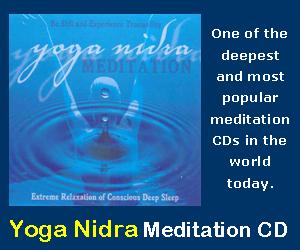|
|
Atma-Shatakam / Nirvana Shatakam
The Song of the Self
by Adi Shankara
788-820 CE
(more by Shankara;
scroll down)
See also:
Index of Philosophy
articles
Mandukya
Upanishad
The great Adi
Shankara (first Shankaracharya) of the eighth century summarized the entirety of Advaita Vedanta (non-dualistic
philosophy) in six stanzas. When a young boy of eight, while
wandering in the Himalayas, seeking to find his guru, he encountered a
sage who asked him, "Who are you?" The boy answered with these
stanzas, which are known as "Nirvana Shatakam" or "Atma
Shatakam." "Nirvana" is complete equanimity, peace,
tranquility, freedom and joy. "Atma" is the True Self. The
sage the boy was talking to was Swami Govindapada Acharya, who was, indeed,
the teacher he was looking for.
These few verses can be of
tremendous value to progress in contemplation practices that lead to
Self-Realization.
| 1) |
I
am not mind, nor intellect, nor ego,
nor the reflections of inner self (chitta). [more]
I am not the five senses. [more]
I am beyond that.
I am not the ether, nor the earth,
nor the fire, nor the wind (the five
elements).
I am indeed,
That eternal knowing and bliss, Shiva,
love and pure consciousness.
|
| 2) |
Neither
can I be termed as energy (prana),
nor five types of breath (vayus), [more]
nor the seven material essences, [more]
nor the five coverings (pancha-kosha). [more]
Neither am I the five instruments of elimination,
procreation, motion, grasping, or speaking. [more]
I am indeed,
That eternal knowing and bliss, Shiva,
love and pure consciousness.
|
| 3) |
I
have no hatred or dislike,
nor affiliation or liking,
nor greed,
nor delusion,
nor pride or haughtiness,
nor feelings of envy or jealousy.
I have no duty (dharma),
nor any money,
nor any desire (kama),
nor even liberation (moksha).
I am indeed,
That eternal knowing and bliss, Shiva,
love and pure consciousness.
|
| 4) |
I
have neither merit (virtue),
nor demerit (vice).
I do not commit sins or good deeds,
nor have happiness or sorrow,
pain or pleasure.
I do not need mantras, holy places,
scriptures (Vedas), rituals or sacrifices (yagnas).
I am none of the triad of
the observer or one who experiences,
the process of observing or experiencing,
or any object being observed or experienced.
I am indeed,
That eternal knowing and bliss, Shiva,
love and pure consciousness.
|
| 5) |
I
do not have fear of death,
as I do not have death.
I have no separation from my true self,
no doubt about my existence,
nor have I discrimination on the basis of
birth.
I have no father or mother,
nor did I have a birth.
I am not the relative,
nor the friend,
nor the guru,
nor the disciple.
I am indeed,
That eternal knowing and bliss, Shiva,
love and pure consciousness.
|
| 6) |
I
am all pervasive.
I am without any attributes,
and without any form.
I have neither attachment to the world,
nor to liberation (mukti).
I have no wishes for anything
because I am everything,
everywhere,
every time,
always in equilibrium.
I am indeed,
That eternal knowing and bliss, Shiva,
love and pure consciousness.
|
|
Sanskrit:
|
|
Mano
Buddhi Ahankara Chitta Ninaham
Nacha Shrotra Jihve Na Cha Ghrana Netre
Nacha Vyoma Bhoomir Na Tejo Na Vayu
Chidananda Rupa Shivoham Shivoham
|
|
Na Cha
Prana Samjno Na Vai Pancha Vayu
Na Va Saptadhatur Na Va Pancha Koshah
Na Vak Pani Padau Na Chopastha Payu
Chidananda Rupa Shivoham Shivoham
|
|
Na Me
Dvesha Ragau Na Me Lobha Mohau
Mado Naiva Me Naiva Matsarya Bhavah
Na Dharmo Na Chartho Na Kamo Na Mokshah
Chidananda Rupa Shivoham Shivoham
|
|
Na
Punyam Na Papam Na Saukhyam Na Dukham
Na Mantro Na Teertham Na Vedo Na Yajnaha
Aham Bhojanam Naiva Bhojyam Na Bhokta
Chidananda Rupa Shivoham Shivoham
|
|
Na Me
Mrityu Shanka Na Me Jati Bhedah
Pita Naiva Me Naiva Mata Na Janma
Na Bandhur Na Mitram Gurur Naiva Shishyah
Chidananda Rupa Shivoham Shivoham
|
|
Aham
Nirvikalpo Nirakara Roopaha
Vibhur Vyapya Sarvatra Sarvendriyanam
Sada Me Samatvam Na Muktir Na Bandhah
Chidananda Rupa Shivoham Shivoham
|

-------
This site is devoted
to presenting the ancient Self-Realization path of the Tradition of
the Himalayan masters in simple, understandable and beneficial ways,
while not compromising quality or depth. The goal of our sadhana or
practices is the highest Joy that comes from the Realization in
direct experience of the center of consciousness, the Self, the
Atman or Purusha, which is one and the same with the Absolute
Reality. This Self-Realization comes through Yoga meditation of the
Yoga Sutras, the contemplative insight of Advaita Vedanta, and the
intense devotion of Samaya Sri Vidya Tantra, the three of which
complement one another like fingers on a hand. We employ the
classical approaches of Raja, Jnana, Karma, and Bhakti Yoga, as well
as Hatha, Kriya, Kundalini, Laya, Mantra, Nada, Siddha, and Tantra
Yoga. Meditation, contemplation, mantra and prayer finally converge
into a unified force directed towards the final stage, piercing the
pearl of wisdom called bindu, leading to the Absolute.
|
|
